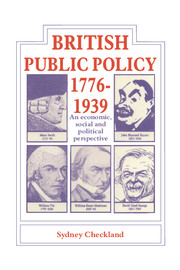Book contents
- Frontmatter
- Contents
- Preface
- Introduction
- Part I Industrialisation and war, 1776–1815
- Part II Assimilating the industrial revolution, 1815–51
- Part III The Victorian apogee, 1851–74
- 6 The market triumphant
- 7 The state and the claims of labour
- 8 The advance of social collectivism
- Part IV Industrial maturity and the ending of pre-eminence, 1874–1914
- Part V Total war and troubled peace, 1914–39
- Bibliography
- Index
7 - The state and the claims of labour
Published online by Cambridge University Press: 05 August 2012
- Frontmatter
- Contents
- Preface
- Introduction
- Part I Industrialisation and war, 1776–1815
- Part II Assimilating the industrial revolution, 1815–51
- Part III The Victorian apogee, 1851–74
- 6 The market triumphant
- 7 The state and the claims of labour
- 8 The advance of social collectivism
- Part IV Industrial maturity and the ending of pre-eminence, 1874–1914
- Part V Total war and troubled peace, 1914–39
- Bibliography
- Index
Summary
Labour as a problem for the state
The period 1851–74, which saw economic liberalism at its peak, was subject to two great counter-tendencies, namely an extension of the public provision of welfare in its various forms, and the making of concessions to the labour force in terms of its right to organise against its employers. In both cases the liberal creed was in principle minimalist, anxious to keep both kinds of concessions as small as possible. In neither, however, could governments wholly resist the trend toward extended involvement.
But there was an important difference between the two. Welfare proceeded on many diverse fronts, each with its peculiar circumstances, whereas the concessions made to labour had to be governed by general rules, applicable to all. It is true that the judiciary also played its part by the interpretation of trade union statutes through case law, handing down verdicts in the particular cases presented to the courts. But these verdicts then became of general application; they gave meaning to the law where statute was ambiguous or silent. In this way the state presided over the contest over wages by setting its rules.
In a sense this was the most difficult of all problems for governments. For it raised the great issue of what posture the state should adopt, at one remove, toward the distribution of the national product, in particular the wages' share against profits and rents.
- Type
- Chapter
- Information
- British and Public Policy 1776–1939An Economic, Social and Political Perspective, pp. 127 - 134Publisher: Cambridge University PressPrint publication year: 1983



